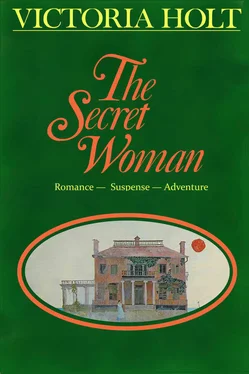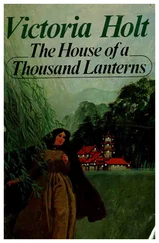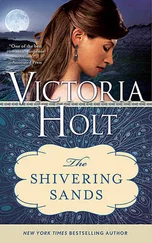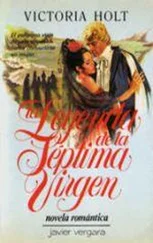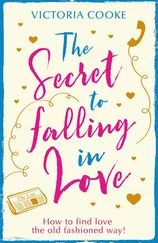Victoria Holt - The Secret Woman
Здесь есть возможность читать онлайн «Victoria Holt - The Secret Woman» весь текст электронной книги совершенно бесплатно (целиком полную версию без сокращений). В некоторых случаях можно слушать аудио, скачать через торрент в формате fb2 и присутствует краткое содержание. Год выпуска: 1970, Издательство: Doubleday, Жанр: Исторические любовные романы, на английском языке. Описание произведения, (предисловие) а так же отзывы посетителей доступны на портале библиотеки ЛибКат.
- Название:The Secret Woman
- Автор:
- Издательство:Doubleday
- Жанр:
- Год:1970
- ISBN:нет данных
- Рейтинг книги:3 / 5. Голосов: 1
-
Избранное:Добавить в избранное
- Отзывы:
-
Ваша оценка:
- 60
- 1
- 2
- 3
- 4
- 5
The Secret Woman: краткое содержание, описание и аннотация
Предлагаем к чтению аннотацию, описание, краткое содержание или предисловие (зависит от того, что написал сам автор книги «The Secret Woman»). Если вы не нашли необходимую информацию о книге — напишите в комментариях, мы постараемся отыскать её.
The Secret Woman — читать онлайн бесплатно полную книгу (весь текст) целиком
Ниже представлен текст книги, разбитый по страницам. Система сохранения места последней прочитанной страницы, позволяет с удобством читать онлайн бесплатно книгу «The Secret Woman», без необходимости каждый раз заново искать на чём Вы остановились. Поставьте закладку, и сможете в любой момент перейти на страницу, на которой закончили чтение.
Интервал:
Закладка:
She could make anything sound attractive by the way she spoke of it. She could dismiss years with a flick of the hand. She made me see not school and Aunt Charlotte but the days ahead when the ugly duckling I was would be transformed into the swan, looking exactly like my mother.
I was eight years old when I saw the Queen’s House for the first time. The cab which had brought us from the station took us through streets very different from those of Bombay. The people looked sedate, the houses imperious. Here and there was a touch of green in the gardens, such green as I had not seen in India, deep and cool; there was a light drizzle in the air. We caught a glimpse of the river for the town of Langmouth was situated on the estuary of the River Lang and it was for this reason that it had become the busy port it was. Scraps of my mother’s chatter lived on in my mind. “What a big ship! Look darling. I suppose that belongs to those people … what’s their name, darling? — those rich and powerful people who own half Langmouth and half of England for that matter?” And my father’s voice: “You mean the Creditons, my dear. They do in fact own a very prosperous shipping line but you exaggerate when you say they own half Langmouth, although it is true that Langmouth owes a certain part of its growing prosperity to them.”
The Creditons! The name stayed with me.
“They would have a name like that,” said my mother. “The creditable Creditons.”
My father’s lips twitched as they did for my mother; it meant he wanted to laugh but felt it was undignified for a Major to do so. He had gained his majority since my birth and extra dignity with it. He was unapproachable, stern, honorable; and I was as proud of him as I was of my mother.
And so we came to the Queen’s House. The carriage drew up before a high red brick wall in which was a wrought-iron gate. It was an exciting moment because standing there looking up at that ancient wall one had no idea what one would find on the other side. And when the gate was opened and we went through it and it shut behind us, the feeling came to me that I had stepped into another age. I had shut out Victorian Langmouth, made prosperous by the industrious Creditons, and had stepped back three hundred years in time.
The garden ran down to the river. It was well kept, though not elaborate and not large either — I should say perhaps three quarters of an acre at most. There were two lawns divided by a path of crazy paving, and on the lawns were shrubs which would doubtless flower in spring or summer; at that time of year they were draped with spiders’ webs on which globules of moisture glistened. There was a mass of Michaelmas daisies — like lovely mauve stars, I thought them — and reddish and gold-colored chrysanthemums. The fresh smell of damp earth, grass and green foliage and the faint scent of the flowers was so different from the heavy frangipani perfume of the blooms which grew in such profusion in the hot steamy Indian air.
A path led to the house, which was of three stories — wider than it was tall; it was of the same red brick as the wall. There was an iron-studded door and beside it a heavy iron bell. The windows were latticed, and I believed that I was aware of a certain air of menace, but that may have been because I knew that I was to be left here in the charge of Aunt Charlotte while my parents went away to their gay and colorful life. That was the truth. There was no warning. I did not believe in such things.
Even my mother though was a little subdued on that occasion; but Aunt Charlotte had the power to subdue anyone.
My father — who was not nearly such a martinet as he liked to pretend — may have been aware of my fear; it may have occurred to him that I was very young to be left to the mercy of school, Aunt Charlotte and the Queen’s House. But it was no unusual fate. It was happening to young people all the time. It was, as he told me before he left me, a worthwhile experience because it taught one to be self-reliant, to face up to life, to stand on one’s own feet; he had a stock of clichés to meet occasions like this.
He tried to warn me. “This is reckoned to be a very interesting house,” he told me. “You’ll find your Aunt Charlotte an interesting woman. She runs this business … she’s clever at it. She buys and sells valuable old furniture. She’ll tell you all about it. That’s why she’s got this interesting old house. She keeps the furniture she buys here and people come here to see it. She couldn’t keep it all in her shop. And of course this sort of business is not ordinary business, so it is quite proper for Aunt Charlotte to do this. It is not as though she were selling butter or sugar over a counter.”
I was puzzled by these social differences but too overawed by my new experiences to bother with such trifles.
He pulled the rope, the old bell clanged and after a wait of some minutes the door was opened by Ellen who dropped a flustered curtsy and bade us come in.
We stepped into a dark hall; odd shapes loomed up all about us and I saw that it was not so much furnished as full of furniture. There were several grandfather clocks and some elaborate ones in ormolu; their ticking was very audible in the silence. The ticking of clocks was something I would always associate with the Queen’s House. I noticed two Chinese cabinets, some chairs and several small tables, a bookcase and desk. They were simply put there, not arranged.
Ellen had run off and a woman was coming toward us. I thought at first she was Aunt Charlotte. I should have known that her neat white cap and black bombazine dress indicated the housekeeper.
“Ah, Mrs. Morton,” said my father who knew her well. “Here we are with my daughter.”
“Madam is in her sitting room,” said Mrs. Morton. “I will inform her that you have arrived.”
“Pray do,” said my father.
My mother looked at me. “Isn’t it fascinating?” she whispered, half fearfully, which told me she didn’t think so but wanted me to. “All these priceless, precious things! Just look at that escritoire! I’ll bet it belonged to the King of the Barbarines.”
“Beth,” murmured my father in indulgent reproof.
“And look at the claws on the arms of that chair. I’m sure it means something . Just think, darling, you may discover. I’d love to know all about these lovely things.”
Mrs. Morton had returned, hands neatly folded over bombazine stomach.
“Madam wishes you to come at once to her sitting room.”
We ascended a staircase lined with tapestries and a few oil paintings which led us straight into a room which seemed to be filled with more furniture; another room led from this and from that another and this third was Aunt Charlotte’s sitting room.
And there she was — tall, gaunt, looking I thought like my father dressed up as a woman; her mid-brown hair with streaks of gray in it was pulled straight back from her big strong face and made into a knot at the back of her head. She wore a tweed skirt and jacket and a severe olive green blouse, the same color as her eyes. I knew afterward that they took their color from her clothes; and as she usually wore grays and that dark shade of green they seemed that tinge too. She was an unusual woman; she might have lived on her small income in some quiet country town, genteelly calling on her friends, leaving cards, perhaps having her own carriage, helping to organize church bazaars, doing charity work, and entertaining in a modest way. But no. Her love of beautiful furniture and porcelain was an obsession. Just as my father had stepped out of line to marry my mother, so had she with her antiques. She had become a business-woman — a strange phenomenon in this Victorian age: a woman who actually bought and sold and who knew so much about her chosen subject that she could compete with men. Later I was to see her hard face light up at the sight of some rare piece and I have heard her talk with passion about the finials on a Sheraton cabinet.
Читать дальшеИнтервал:
Закладка:
Похожие книги на «The Secret Woman»
Представляем Вашему вниманию похожие книги на «The Secret Woman» списком для выбора. Мы отобрали схожую по названию и смыслу литературу в надежде предоставить читателям больше вариантов отыскать новые, интересные, ещё непрочитанные произведения.
Обсуждение, отзывы о книге «The Secret Woman» и просто собственные мнения читателей. Оставьте ваши комментарии, напишите, что Вы думаете о произведении, его смысле или главных героях. Укажите что конкретно понравилось, а что нет, и почему Вы так считаете.
